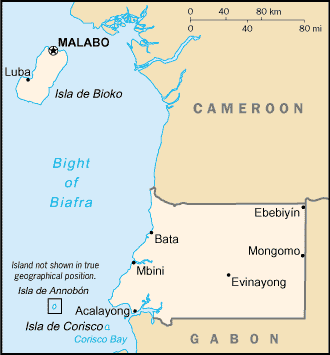Map:

Overview:
Equatorial Guinea gained independence in 1968 after 190 years of Spanish rule. This tiny country, composed of a mainland portion plus five inhabited islands, is one of the smallest on the African continent. President OBIANG NGUEMA MBASOGO has ruled the country for over two decades since seizing power from his uncle, then President MACIAS, in a 1979 coup. Although nominally a constitutional democracy since 1991, the 1996 and 2002 presidential elections - as well as the 1999 legislative elections - were widely seen as being flawed. The president controls most opposition parties through the judicious use of patronage. Despite the country's economic windfall from oil production resulting in a massive increase in government revenue in recent years, there have been few improvements in the country's living standards.
The People:
Population: 535,881 (July 2005 est.)
Age structure:
0-14 years: 41.7% (male 112,326/female 111,244)
15-64 years: 54.5% (male 140,568/female 151,500)
65 years and over: 3.8% (male 8,900/female 11,343) (2005 est.)
Religions:
nominally Christian and predominantly Roman Catholic, pagan practices
Government Type:
republic
Leader(s) to pray for:
chief of state: President Brig. Gen. (Ret.) Teodoro OBIANG NGUEMA MBASOGO (since 3 August 1979 when he seized power in a military coup)
head of government: Prime Minister Miguel Abia BITEO BORICO (since 14 June 2004); First Deputy Prime Minister Mercelino Oyono NTUTUMU (since 15 June 2004); Deputy Prime Minister Ricardo Mangue Obama NFUBEA (since 15 June 2004)
Source: The World Factbook
View All Countries